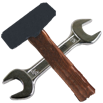The hinges on the doors of kitchen cabinets doors are fixed in the closed and open positions. If you do not bring the hand up to the door closed position, but at least a little to close to the door itself, it begins to rattle. To the doors of kitchen cabinets are not clapping, and close smoothly and quietly invented a special shock absorber, which "catches up" before closing the door - its resistance reduces the speed and slowly releases it to the closed state. When opening the door does not interfere, since the door is not connected, and only touches it. After opening the door to the inner damper spring returns to its original position.
Almost all new furniture provides a convenient attachment of shock absorbers directly on the loop, and they can be packaged.



And to the old furniture set shock absorber have to be invented. Shock absorbers are sold in various stores can be ordered in various foreign websites, since they are not "penny" (in stores they are from Peter hundred rubles apiece), and they may need a dozen or more.
I have installed on the lower kitchen cabinets. To not spoil a shock appearance and not to hinder them were attached to the table top. Now they do not see, if you do not bend over and not to look.
Location closer to the door, then picked up the experimental method, meshing damper special projection.

It is necessary that the door stopped clapping and thus that no longer close. The hinges are weak and even a shock absorber may prevent complete closure of the door. Defines the location and fasten in front of the place on top of shock absorber.
This model has the staffing mount - double sided tape. But the effectiveness of this method do not believe - sooner or later will come off, and most likely sooner. Therefore, as the fastening screws selected, enough to hold the three shock. Look at the length of the screws was not the thickness of the countertop to the top is not povylazili. First, screw the one side, and then the door closed position defining damper so that the rod was fully retracted. Based on this face is screwed restrictive screw (pictured it in an orange wrapper). Then screw the screw of the second side, they can press the shock absorber, not to hang out.


Slightly missed piston rod does not retract fully, so we had to increase the thickness of the socket screws, putting him on a piece of dowel.
You can check. We are trying to slam the door slightly, shock absorber will not do that - the door closes smoothly and almost silently.
 Full-Repair.com
Full-Repair.com